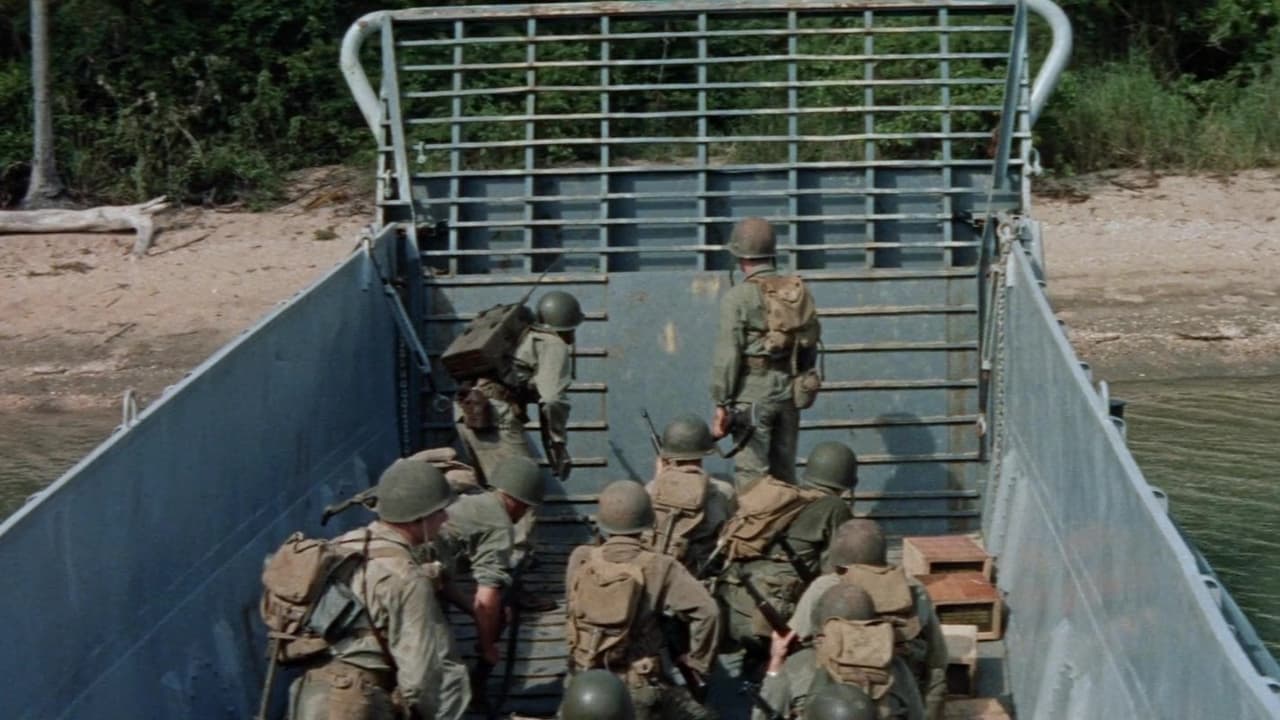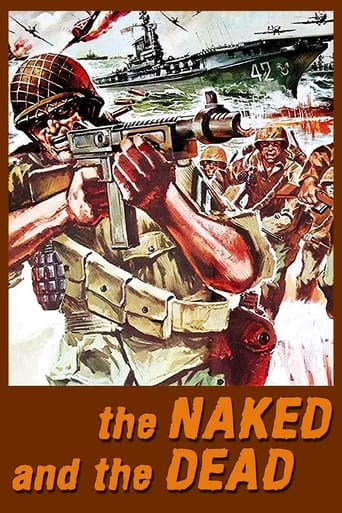

Really Surprised!
... View MoreAlthough it has its amusing moments, in eneral the plot does not convince.
... View MoreI think this is a new genre that they're all sort of working their way through it and haven't got all the kinks worked out yet but it's a genre that works for me.
... View MoreStory: It's very simple but honestly that is fine.
... View MoreNorman Mailer's classic novel receives weak treatment in this film.First, we see a bar in Honolulu where the cops raid the joint frequented by GI's in 1943. Then, we see newspaper clips of defeats suffered by our guys in the Pacific. Then, we get a movie. Where exactly in the Pacific is the action going on?The weak writing still allows for 2 solid performances by Aldo Ray, as a vicious sergeant, who enjoys pumping bullets into his Japanese captors and Raymond Massey, as an army head who feels that he gets the best out of his men by being tough and cruel as well.In flashback sequence, we see Ray married to Barbara Nichols, the dumb blond who knew occasionally how to turn in a good dramatic performance. Her acting here is amateurish at best. In fact, she sounds as she did on the old Ed Sullivan Show when she told the Romans that she begged Julie (Caesar) not to go to the forum. Not here, unfortunately! Flashbacks also bring us back to Robertson's civilian life where all he did was to cavort around lots of women.Cliff Robertson is Massey's assistant, who soon falls out of favor with the latter when they disagree on Massey's philosophy. Robertson, who smokes heavily in the film, gets shot for his efforts and becomes very preachy at the final scene of this film.There is plenty of anti-semitism to go around in this movie as well. Jerry Paris, as Goldstein, is coerced to his death by a fall over a mountain by being called a lousy J--. Joey Bishop has to fight an anti-semitic soldier as well. One funny scene is where Bishop throws away a sandwich when he finds out that it's made up of ham!
... View MoreRaoul Walsh's films of the 1950's are uncharted territory, much like the South Pacific island where most of the action in Naked and the Dead unfolds. Many of the films aren't available or are rarely seen. Of those that are, I'm only familiar with a series of Clark Gable films serving mostly as an excuse for Walsh, through Gable, to flaunt his reactionary values, missing body parts, and old-sea-salt virility. In none of these films was there any indication that Walsh could deliver something of the scale and complexity of Naked and the Dead, which more than equals mid-period lulus like The Roaring Twenties. Walsh was an arbitrary choice to film Norman Mailer's novel. Mailer wrote the book as a young man with a name to make and awards to win. In 1958 Walsh had nothing left to prove to anyone -- even when he was Mailer's age, I can't imagine him going for Mailer's bludgeoning tactics. Though I'm no Mailer acolyte, you do miss his chutzpah at first, as the movie has a laid-back feel more appropriate for a beach volleyball film. An amphibious landing that brings echoes of D-Day is carried out near the beginning of the film, during which we're told that 130 men have died, but we don't see a single limb get blown off. We just get a couple shots of smoke rising out of the forest as the ships land. You start to worry that Walsh, like in those Errol Flynn war films of the 1940's, has brought his crew down to Pasadena to film in a state park with three potted palm trees.However, the interplay between the actors -- Walsh favors long-takes with eight or nine guys just shooting the s--t, stirring hooch and whining about their superiors -- is enough to keep you watching. Eventually it dawns on you that Walsh has seen much more of life than Mailer. He is long past the need to sadistically linger on the more dramatic moments of war. You can feel Walsh feeding off his group of actors, basking in their youth while lovingly depicting their trials of life, the same ones he underwent half a century ago. The approach is very much like Scorsese's in The Aviator in its tendency to concentrate on hope and promise, a refusal to wallow in the ugly. Right to the end Walsh resists the impulse to ratchet up the tension -- like a conductor guiding his music with a steady pulse, the movie just keeps plodding along, and a horrific death is given no more emphasis than a running joke about Raymond Massey's character getting a daily bunch of flowers. In the final hour, his method pays off. The landscapes open up in spectacular fashion, just as each character moves inexorably towards an action that will define them within time like a pin in a map. An authenticity grips the movie and won't let go. The way Walsh has of letting major events happen offscreen begins to feel ominous and evocative of unseen forces, worthy of Jacques Tourneur, and the underpopulated battles take on massive grandeur in the imagination. A culminating sequence featuring rows upon rows of tanks and mortars battering an invisible enemy is what all directors want to achieve -- a moment that goes beyond words into an expression of pure cosmic power, millenia of sorrow and rage blending into a firework display for the gods. Think of this as The Naked and the Dead, and you'll be disappointed. Think of it as what Terence Malick wanted to do with The Thin Red Line, and you will see exactly where he went wrong, and where Walsh succeeds. Walsh blows the world up good, but unlike the lords of war, he does it for love, not personal gain. And he takes us all out equally.
... View MoreFrom Norman Mailer's celebrated book about kill-happy Army sergeant in the Pacific, 1943. In the lead, handsome Aldo Ray gets a chance to show his swagger portraying a man doing battle with the enemy as well as with himself and his own men; otherwise, this glum effort is War-is-Hell routine. Bernard Herrmann's score sounds suspiciously like the one he turned in for "Taxi Driver" in 1976. Hmmm....
... View MoreI have not read Mailer's book but I did see some Walsh Movies ("pursued" "white heat" "Colorado territory") and those movies feature touches of madness -the end of "white heat" is memorable-,this madness which emerges again in this war movie.The key of the movie is given by the sarge telling his men that they are not part of the Army.He's arguably a lunatic but he did understand:the enemy is not the Japs -whom we barely see anyway-,but as Pottier wrote in "l'Internationale" our own generals.Cummings ' s attitude echoes to that:see him playing chess -an obvious metaphor- or "waging war" in front of a model.Cummings 's madness (which is true , the cigarette scene is revealing )matches the sarge's one.Walsh,though his film is very harsh ,shows compassion,notably for the soldier whose wife died in child-birth . The final lines of the lieutenant ,saved by his men,are:they did not do it out of fear but out of pity.
... View More